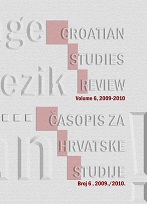Odnos crkvenoslavenskoga jezika i govornoga jezika u hrvatskome srednjovjekovlju
The relation between Old Church Slavonic and “lingua vernacular” in the Croatian Middle Ages
Author(s): Gordana Galić Kakkonen, Katarina Lozić KnezovićSubject(s): Language and Literature Studies
Published by: Croatian Studies Centre
Keywords: Croatian Middle Ages; bilingualism; diglossia/triglossia; Chakavian dialect; Croatian language; lingua vernacula; Old Church Slavonic; Slavonic languages
Summary/Abstract: Croatian Middle Ages is the most complex period in history of Croatian language. Functioning multilingualism, present at that time, brings to the conclusions that between Old Church Slavonic and vernacular language there were no bilinguialism but rather diglossia or triglossia, which have high, medium and lower variation. The authors are bringing argumntents for a such hypothesis, and that is the existence of Chakavian-Old Church Slavonic amalgam, the existence of Croatian Old Church Slavonic language and vernacular Croatian language.
Journal: Croatian Studies Review - Časopis hrvatskih studija
- Issue Year: 2009
- Issue No: 6
- Page Range: 211-226
- Page Count: 16
- Language: Croatian

